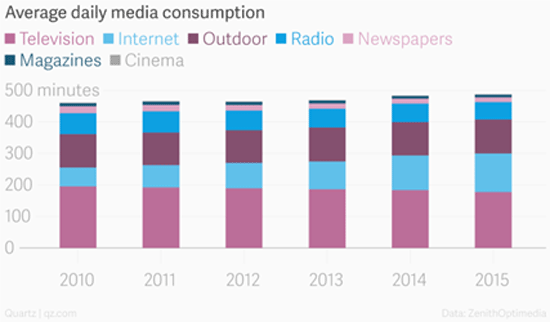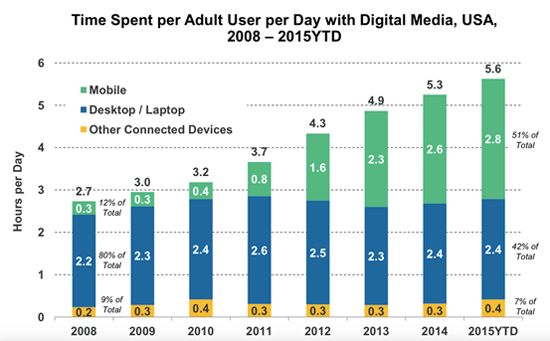Connecting the Dots: It’s a Small, Small Handheld World
By Tony Sagami
According to a new study from ZenithOptimedia, Americans spend an average of 490 minutes a day with some sort of media, mostly television (three hours a day) and the Internet (two hours a day).

The fastest-growing entertainment medium is—no surprise—the Internet. It accounted for 13% of average daily media use in 2010, but is set to reach nearly 30% in 2017.
The biggest media loser are newspapers, so if you own any newspaper stocks, you might want to ask yourself how they’ll fare in the future, because people just aren’t reading newspaper as much as they used to.
My father used to spend what seemed like hours every day reading our local newspaper, but today people only spend an average of 16 minutes a day reading newspapers, down 25% from 22 minutes a day in 2010.
And when it comes to the accessing the Internet, smartphones have overtaken personal computers. A whopping 51% of the total time people connect to the Internet, they’re doing it through smartphones and other mobile devices.

And once people get connected… they stay connected for a long time. The typical Internet user spends 20 hours and 30 minutes a week online; three and a half hours longer each week than in 2013.
Even our TV viewing habits are affected. 27% of us (that jumps to 39% for 16- to 24-year-olds) watch TV and video on the Internet, compared to 10% in 2007.
Of course, this has huge implications for every part of the Internet food chain.
- Social media connectors: Facebook, Twitter, LinkedIn
- Content providers: Yahoo, Netflix, Google
- Smartphone manufacturers: Apple, Samsung
- E-tailers: Priceline, eBay, Amazon
- Infrastructure: Cisco, Juniper Networks
And don’t forget about the Chinese Internet giants either, like Tencent Holdings Ltd. (TCEHY), Baidu, Inc. (BIDU), Rakuten, Inc. (RKUNY), NetEase, Inc. (NTES), Sina Corporation (SINA), Alibaba Group Holding Ltd. (BABA), Weibo Corporation (WB), Ctrip.com International Ltd. (CTRP), and Sohu.com, Inc. (SOHU).
Prediction: I bet the above Chinese stocks will deliver TWICE the gains you can make on the above-listed American Internet kings.
But my hottest tip right now concerns the future #1 industrial metal. Without it, those fancy smartphones wouldn’t even exist—nor would laptops and electric cars. Everyone is talking about this metal, but unlike iron, zinc, or copper, there’s only one good way to invest in it if you want both ongoing high yield and exposure to rising share prices.
The company I recommend in the brand-new June issue of Yield Shark (which is being published today) has shown an annual earnings growth of 12% for the last 14 years, has consistently grown its dividends for the past 20 years, and is currently undervalued.

Tony Sagami
30-year market expert Tony Sagami leads the Yield Shark and Rational Bear advisories at Mauldin Economics. To learn more about Yield Shark and how it helps you maximize dividend income, click here. To learn more about Rational Bear and how you can use it to benefit from falling stocks and sectors, click here.






I used to track newspaper readership competitively when I was in the Radio ad biz and I can tell you that “time spent reading” figure of 22% is pure bullshit, at least here in the U.S.. Back in the early 90’s it was down to 17 minutes per day; now it has to be much lower and of course who even subscribes to a paper outside of NYC?